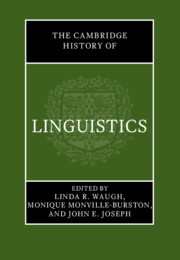Waugh, Linda R., Monique Monville-Burston, John E. Joseph, ed. 2023. The Cambridge History of Linguistics. Cambridge: Cambridge University Press. 900 p. ISBN 9780511842788. DOI: https://doi.org/10.1017/9780511842788
Publisher’s website
Book description
The establishment of language as a focus of study took place over many centuries, and reflection on its nature emerged in relation to very different social and cultural practices. Written by a team of leading scholars, this volume provides an authoritative, chronological account of the history of the study of language from ancient times to the end of the 20th century (i.e., ‘recent history’, when modern linguistics greatly expanded). Comprised of 29 chapters, it is split into 3 parts, each with an introduction covering the larger context of interest in language, especially the different philosophical, religious, and/or political concerns and socio-cultural practices of the times. At the end of the volume, there is a combined list of all references cited and a comprehensive index of topics, languages, major figures, etc. Comprehensive in its scope, it is an essential reference for researchers, teachers and students alike in linguistics and related disciplines.
Reviews
‘This multi-authored volume surveys the fascinating history of the study of language, from its beginnings in ancient Mesopotamia and Egypt to the diversification of the language sciences in the past half-century. The wide chronological and geographical scope, the broad view of the language sciences in their relation to psychology, sociology and anthropology, the accuracy of historiographical analysis, avoiding unnecessary technical jargon, and the comprehensive coverage up to the most recent developments, make the CHL a major reference work for teachers and students of linguistics, and readers interested in the fascinating history of language study.’
Pierre Swiggers – University of Leuven and Université de Liège
‘The Cambridge History of linguistics is an impressive one-volume accomplishment which is remarkable by its depth – it spans more than twenty centuries of learned thinking about language – by its breadth – across centuries and across continents – and by the diversity of its themes – a fresco across centuries with a large section devoted to present-day linguistics and interdisciplinary work on language.’
Georges Daniel Veronique – Professor emeritus, Aix-Marseille Université
-
Introduction
pp 1-6
-
5 – Early to Late Medieval Europe
pp 144-174
-
6 – Near Eastern Linguistic Traditions
pp 175-177
-
6A – The Syriac Linguistic Tradition
pp 178-182
-
6B – The Hebrew Linguistic Tradition
pp 183-194
-
6C – The Arabic Linguistic Tradition
pp 195-212
-
7 – Universal Language Schemes
pp 233-257
-
8 – Locke and Reactions to Locke, 1700–1780
pp 258-280
-
9 – Rousseau to Kant
pp 281-307
-
11 – Early Nineteenth-Century Linguistics
pp 326-344 -
-
14 – Structuralism in Europe
pp 467-495
-
15 – British Linguistics
pp 496-517
-
19 – Semantics and Pragmatics
pp 618-655
-
21 – Lexicology and Lexicography
pp 682-703
-
25 – Language and Society
pp 782-805
-
26 – Language and Anthropology
pp 806-832
-
28 – Semiotics
pp 859-884
-
29 – Applied Linguistics
pp 885-910
-

